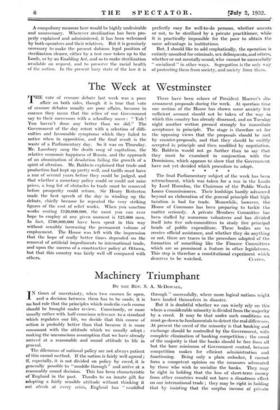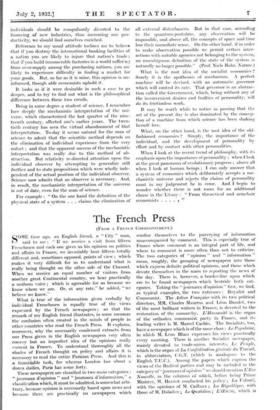Machinery Triumphant
BY THE REV. S.
A. McDowALL.
IN times of uncertainty, NVIIC11 two courses lie open, and a decision between them has to be made, it is no bad rule that the principles which underlie each course should be brought under review. Consciously, or more usually rather with half-conscious reference to a standard which regulates our life, we decide that this course of action is probably better than that because it is more consonant with the attitude which we usually adopt ; making the unconscious assumption that we have already arrived at a reasonable and sound attitude to life in general.
The dilemmas of national policy are not always patient of this casual method. If the nation is fairly well agreed ; if, especially, it is not divided on policy by creed, it is generally possible to "muddle through" and arrive at a reasonably sound decision. This has been characteristic of *England in the past. Thanks to an innate gift for adopting a fairly sensible attitude without thinking it out afresh at every crisis, England has " muddled through" successfully, where more logical nations might have landed themselves in disaster.
But it is doubtful whether we can wisely rely on this where a considerable minority is divided froni the majority by a creed. It may be that under such conditions we must go down to fundamentals to detect the real difference. At present the creed of the minority is that banking and exchange should be controlled by the Government, with complete elimination of banking competition ; the creed of the majority is that the banks should be free from all but the bare minimum of Government control, because competition makes for efficient administration and functioning. Being only a plain onlooker, I cannot form a competent opinion on the measures advocated by those who wish to socialize the banks. They may be right in holding that the loss of short-term money from other countries would not have a disastrous effect on our international trade ; they may be right in holding that by insisting that the surplus income of private individuals should be compulsorily diverted to the financing of new industries, thus increasing our pro- ductivity, we should find ourselves enriched.
Reference to my usual attitude inclines me to believe that if you destroy the international banking facilities of a nation you are likely to injure that nation's trade ; that if you build innumerable factories in a world suffernl. from over-supply among the purchasing nations, you are likely to experience difficulty in finding a market for your goods. But, so far as it is mine, this opinion is un- informed, though able economists uphold it.
It looks as if it were desirable in such a case to go deeper, and to try to find out what is the philosophical difference between these two creeds.
Being in some degree a student of science, I remember how deeply the mechanistic interpretation of the uni- verse, which characterized the last quarter of the nine- teenth century, affected one's earlier years. The twen- tieth century has seen the virtual abandonment of that interpretation. To-day it seems natural for the man of science to admit that the scientific method depends on the elimination of individual experience from the very outset ; and that the apparent success of the mechanistic interpretation was really due to this method of ab- straction. But relativity re-directed attention upon the individual observer by attempting to generalize still further and to state propositions which were wholly inde- pendent of the actual position of the individual observer. Science now admits that an observer is necessary. And, in result, the mechanistic interpretation of the universe is out of date, even for the man of science.
For example "On the one hand the definition of the physical state of a system . . . claims the elimination of all external disturbances. But in that case, according to the quantum-postulate, any observation will be impossible, and above all, the concepts of space and time lose their immediate sense. On the other hand, if in order to make observation possible we permit certain inter- actions with suitable agencies not belonging to the system, an unambiguous definition of the state of the system is naturally no longer possible." (Prof. Niels Bohr, Nature.) What is the root idea of the socialist economics ? Surely it is the apotheosis of mechanism. A perfect machine will be devised, with an automatic governor which will control its rate. That governor is an abstrac- tion called the Government, which, being without any of the inconvenient desires and frailties of personality, will do its frictionless work.
It may be worth while to notice in passing that the art of the present day is also dominated by the concep- tion of a machine from which science has been shaking herself free.
What, on the other hand, is the root idea of the old- fashioned economics ? Simply, the importance of the individual, and the development of personality by effort and by contact with other personalities.
When I look at the recent trend of philosophy, with its emphasis upon the importance of personality ; when I look at the great panorama of evolutionary progress ; above all when I look at human beings ; I can only answer that a system of economics which deliberately accepts a me- chanistic universe and rejects the claims of personality must in my judgement be in error. And I begin to wonder whether there is not room for an additional clause in the Litany : " From theoretical and armchair economists . . . .







































 Previous page
Previous page